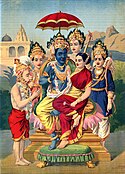Ashoka Vatika

Ashoka Vatika (Sanskrit: अशोकवाटिका, romanized: Aśokāvāṭikā) is a grove[1] in Lanka that is located in the kingdom of the rakshasa king Ravana. It is mentioned in the Vishnu Purana and the Hindu epic Ramayana of Valmiki, and all subsequent versions, including the Ramacharitamanas written by Tulsidas, where it finds mention in the Sundara Kanda.[2] The Vatika has garden houses around it, built by Vishvakarma himself.[3]
Literature
[edit]It was the location where Sita, the wife of Rama, was held captive by Ravana after her abduction, also because she refused to stay in Ravana's palace and preferred to stay under shimshapa tree in Ashoka Vatika. It was here that Ravana's wife Mandodari came to meet her and also where Hanuman met her for the first time, and identified himself with the finger ring of Rama.

Sita stayed at Ashoka Vatika until the end of the epic battle between Rama and Ravana, which resulted in the destruction of Ravana himself and most of this clan. Much of the Ashoka Vatika was destroyed by Hanuman when he first visited Lanka searching for Sita. Also destroyed was the Pramda Vana at the centre of the Ashoka Vatika.[3]
Identification
[edit]
Its present location is believed to be the Hakgala Botanical Garden, in the area known as Seetha Eliya, close to the resort city of Nuwara Eliya. The garden is situated at the base of the Hakgala Rock forms, has Sita Pokuna, a barren area atop the Hakgala Rock Jungle, where Sita was supposedly held captive; the Sita Amman Temple is located here. Another connected site is a spot where Sita bathed in a stream at Sita Eliya, called Sita Jharna.[4] The site has attracted media interest in recent years owing to its connection with Hindu mythology.[5][6]
References
[edit]- ^ Krishna, Nanditha (2014-05-15). Sacred Plants of India. Penguin UK. ISBN 978-93-5118-691-5.
- ^ Sundar Kand - Arrival of Ravana at Ashoka Vatika (English translation) Archived October 1, 2009, at the Wayback Machine.
- ^ a b Historic Rama of Valmiki: Shastragrahi Rama, by Visvanath Limaye. Published by Gyan Ganga Prakashan, 1985. Page 142, 189.
- ^ Ramayana sites in Sri Lanka tourslanka.com.
- ^ Tracing evidence of Lord Ram and his times Archived 2009-03-10 at the Wayback Machine Zee News.
- ^ "Sita's Ashok Van awaits restoration in Lanka". Sify.com.

